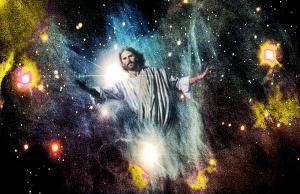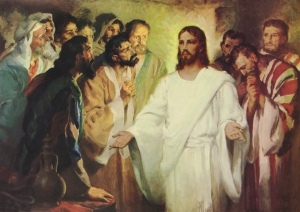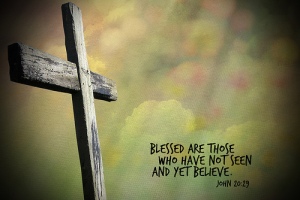“In the Wilderness”
Luke 4:1-13
February 14, 2016, First Presbyterian Church of Holt
 Think of a time in your life when you felt lost. That will look like different things to everyone of you. Perhaps it was being separated from your parent or from your child in the grocery store, that panic of not knowing where they’d gone. Maybe it was shortly after getting your driver’s license, or coming back to a place you hadn’t been in a long time, and where you thought you were is not where you are. Maybe it was following the loss of a loved one, when all the dependable patterns of your life seemed to disappear, and you weren’t really sure where to go from there. Perhaps it was in a season of mental or physical illness, when your body or mind were betraying how you were used to looking at the world, redefining what it was you could do, how it was you could go on.
Think of a time in your life when you felt lost. That will look like different things to everyone of you. Perhaps it was being separated from your parent or from your child in the grocery store, that panic of not knowing where they’d gone. Maybe it was shortly after getting your driver’s license, or coming back to a place you hadn’t been in a long time, and where you thought you were is not where you are. Maybe it was following the loss of a loved one, when all the dependable patterns of your life seemed to disappear, and you weren’t really sure where to go from there. Perhaps it was in a season of mental or physical illness, when your body or mind were betraying how you were used to looking at the world, redefining what it was you could do, how it was you could go on.
When we are feeling lost, our fear, panic, and isolation transform wherever we are into a wilderness, an unknown place where we are laid bare.
 Pastor and professor Barbara Brown Taylor writes, “Wildernesses come in so many shapes and sizes that the only way you can really tell you are in one is to look around for what you normally count on to save your life and come up empty. No food. No earthly power. No special protection–just a Bible-quoting devil and a whole bunch of sand.”
Pastor and professor Barbara Brown Taylor writes, “Wildernesses come in so many shapes and sizes that the only way you can really tell you are in one is to look around for what you normally count on to save your life and come up empty. No food. No earthly power. No special protection–just a Bible-quoting devil and a whole bunch of sand.”
 I remember one of the first times I read this passage and I did a bit of a double take when I heard how Jesus got into this wilderness predicament. Did you catch it?
I remember one of the first times I read this passage and I did a bit of a double take when I heard how Jesus got into this wilderness predicament. Did you catch it?
“Jesus, full of the Holy Spirit, returned from the Jordan and was led by the Spirit in the wilderness, where for forty days he was tempted by the devil.”
He wasn’t there by some accident or some trick, Jesus was in the wilderness because the spirit led him there. But he is not left alone. In both Matthew and Mark’s account of this Jesus’ wilderness time, scripture says that angels waited on Jesus, and were there for him when he emerged from the wilderness.
 So what does this mean for us? It means that God does not leave us in our wildernesses, but that the Holy Spirit accompanies us, strengthening us with the knowledge and the hope to get us through. Perhaps in those times when we thought we were the most alone, we were indeed surrounded by angels.
So what does this mean for us? It means that God does not leave us in our wildernesses, but that the Holy Spirit accompanies us, strengthening us with the knowledge and the hope to get us through. Perhaps in those times when we thought we were the most alone, we were indeed surrounded by angels.
 I recently read Jenny Lawson’s book, “Furiously Happy.” In it she speaks extensively about her struggles with mental illness and how her vulnerability has enabled her to connect with and help so many. She writes this to the readers of her blog, “When I came out so many years ago about my depression and anxiety disorder I was afraid you’d all run away screaming. But you didn’t. Instead, thousands of you said
I recently read Jenny Lawson’s book, “Furiously Happy.” In it she speaks extensively about her struggles with mental illness and how her vulnerability has enabled her to connect with and help so many. She writes this to the readers of her blog, “When I came out so many years ago about my depression and anxiety disorder I was afraid you’d all run away screaming. But you didn’t. Instead, thousands of you said  ‘Me too,’ and ‘I thought I was the only one,’ and ‘It’s not just me?’ You gave me the strength to be honest about my flaws and the support to realize that I was more than the broken parts that make up me. And you did something else you might not even realize…
‘Me too,’ and ‘I thought I was the only one,’ and ‘It’s not just me?’ You gave me the strength to be honest about my flaws and the support to realize that I was more than the broken parts that make up me. And you did something else you might not even realize…
In the years since I started writing about mental illness I’ve received so many letters from people who were affected by this community, but there were special ones I kept in a folder that I named  “‘The Folder of 24.’ – It was called that because it contained 24 letters from people who were actively planning their suicide, but decided to get help instead. And not because of what I said…they did it because of you. Almost every single one explained that what convinced them that depression was lying to them was the amazing response to my posts. They could look at a single person like me and think it was still a rare illness or something to be ashamed about…but when thousands of strangers shout out into the darkness that they are there too, it makes ripples. And those anonymous strangers saved lives without even knowing it. If you ever left a comment or a kind word you may have been the cause of someone’s mother or daughter or son being alive. Being thankful to be alive.
“‘The Folder of 24.’ – It was called that because it contained 24 letters from people who were actively planning their suicide, but decided to get help instead. And not because of what I said…they did it because of you. Almost every single one explained that what convinced them that depression was lying to them was the amazing response to my posts. They could look at a single person like me and think it was still a rare illness or something to be ashamed about…but when thousands of strangers shout out into the darkness that they are there too, it makes ripples. And those anonymous strangers saved lives without even knowing it. If you ever left a comment or a kind word you may have been the cause of someone’s mother or daughter or son being alive. Being thankful to be alive.
When I was on tour with my last book I’d sometimes talk about the Folder of 24 and how that folder is the best reason I’ll ever have for writing. And then something strange happened. After a reading people would lean in close and whisper ‘I was 25.’’’
Jenny Lawson’s wilderness of depression and anxiety was wilderness because of how isolated she felt within it and when she allowed herself to be vulnerable enough to let others into the pain she was experiencing, she felt their “me too”s surrounding her, helping to lessen not only her pain, but also their own. In bringing her story to the light she brought others into the light alongside her.
 I believe that this is the work of the Holy Spirit, transforming wilderness into community, vulnerability into hope, through the empathy of others. Being the beloved community together requires us to be a people of vulnerability, honestly allowing others into the fractured part of our lives, but being in community means that’s not the end of it. A gift of vulnerability offered by another requires response, and it is important what that response will be. If our response is one of judgement or discomfort it can widen our wildernesses and increase our isolation. Vulnerability is an invitation to extend our own “me too”s. Not that we should ever pretend to know the complexities of the hurt of another, but that vulnerability should be met with our own vulnerability, extending empathy rather than sympathy, so that we may meet people in their wilderness and journey alongside them.
I believe that this is the work of the Holy Spirit, transforming wilderness into community, vulnerability into hope, through the empathy of others. Being the beloved community together requires us to be a people of vulnerability, honestly allowing others into the fractured part of our lives, but being in community means that’s not the end of it. A gift of vulnerability offered by another requires response, and it is important what that response will be. If our response is one of judgement or discomfort it can widen our wildernesses and increase our isolation. Vulnerability is an invitation to extend our own “me too”s. Not that we should ever pretend to know the complexities of the hurt of another, but that vulnerability should be met with our own vulnerability, extending empathy rather than sympathy, so that we may meet people in their wilderness and journey alongside them.
 This empathetic response is part of the very fiber of our Christian story. Our God is a God with us, a God of “me too”s, not keeping at a distance in our wilderness, but walking through the dark valleys with us. When we kept God at a distance through our sin, God sent Jesus to become one of us to truly empathize with the human experience. When he was on earth he didn’t avoid the wildernesses of this world, but entered right into them, extending a hand to lepers, befriending prostitutes, sharing wells with Samaritans, and going toe to toe with the devil itself. He could have rightly claimed his place as a king among kings, but instead chose to be a human among humanity.
This empathetic response is part of the very fiber of our Christian story. Our God is a God with us, a God of “me too”s, not keeping at a distance in our wilderness, but walking through the dark valleys with us. When we kept God at a distance through our sin, God sent Jesus to become one of us to truly empathize with the human experience. When he was on earth he didn’t avoid the wildernesses of this world, but entered right into them, extending a hand to lepers, befriending prostitutes, sharing wells with Samaritans, and going toe to toe with the devil itself. He could have rightly claimed his place as a king among kings, but instead chose to be a human among humanity.
 And in the ultimate act of vulnerability Jesus met the brokenness and pain of Judas, Pilate, and throngs of the disenchanted with his willing innocence. He met the brokenness and sins of this world with his very life. In the pain of his death our pain is met, matched, and healed.
And in the ultimate act of vulnerability Jesus met the brokenness and pain of Judas, Pilate, and throngs of the disenchanted with his willing innocence. He met the brokenness and sins of this world with his very life. In the pain of his death our pain is met, matched, and healed.
Through his life Jesus taught us to be a people of “me too”, to meet people in their wilderness, not as one looking from the outside, but from one in the midst. May we be emboldened by this witness to be vulnerable with our lives and empathetic with our love, ever striving to be God’s beloved community. Amen.

























